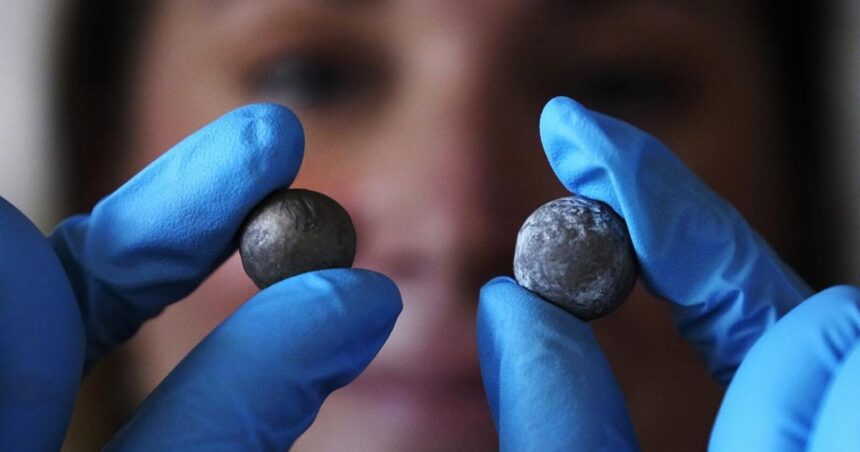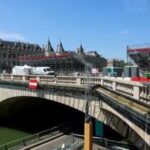CONCORD, Mass. — Nearly 250 years ago, hundreds of militiamen lined a hillside in Massachusetts to fire a barrage of musket balls toward retreating British troops, in the first major battle of the Revolutionary War.
Museum curator Nikki Walsh holds up two Revolutionary War musket balls Monday at Minute Man National Historical Park in Concord, Mass. Archeologists say the musket balls date back nearly 250 years and are believed to have been fired at the British by Colonial militiamen during one of the first battles in the Revolutionary War.
The latest evidence of that firefight is five musket balls dug up last year near the North Bridge site in the Minute Man National Historical Park in Concord. Early analysis of the balls — gray with sizes ranging from a pea to a marble — indicates colonial militia members fired them at British forces on April 19, 1775. “As soon as they pulled one of them out of the ground, there was kind of a ‘look what I have,’” said Minute Man park ranger and historic weapons specialist Jarrad Fuoss, who was there the day the musket balls were discovered.”And of course, everybody goes flocking to them like, ‘Oh, my gosh.’ We’re looking at them, and then the excitement continued to grow because it wasn’t just one,” he continued. “And the fact that we found five of them, which is incredible all these years later.”
Musket balls were previously found in the historic park of about 1,000 acres outside Boston, which marks a series of opening battles of the American Revolution. About a decade ago, about 30 musket balls were found at the site known as Parker’s Revenge, where the Lexington militia company led by Capt. John Parker ambushed British troops. In the early 19th century, Henry David Thoreau was walking in the area and found a few musket balls from what is believed to be the North Bridge fight.

The latest discoveries are the most ever found from that fight when militia leaders ordered their men to fire on government troops. The event led to the conflict escalating and was later dubbed the “shot heard round the world” by Ralph Waldo Emerson in his 1837 “Concord Hymn.” About 800 British soldiers had started the day marching from Boston to Concord to destroy military supplies they believed that colony rebels had gathered. It ended with an eight-hour battle that stretched to the Charlestown neighborhood of Boston — covering 16 miles and leaving 273 British troops and 96 militiamen dead and wounded. It prompted the militia to create an 11-month siege of Boston, leading to the Battle of Bunker Hill in June 1775, one of the bloodiest battles of the American Revolution.






